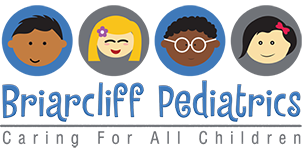Well Child Visits for Newborns
- On Jun, 04, 2024
- Doctor Notes
- Well Child
 There is a common phrase I’m sure you’ve heard throughout your life: “It takes a village to raise a child.” We often say this in jest, but there is real truth to this statement. It is important to surround yourself with a community of people that you trust, ensuring your children grow and develop in a safe and healthy environment. One important member of that community is your pediatrician.
There is a common phrase I’m sure you’ve heard throughout your life: “It takes a village to raise a child.” We often say this in jest, but there is real truth to this statement. It is important to surround yourself with a community of people that you trust, ensuring your children grow and develop in a safe and healthy environment. One important member of that community is your pediatrician.
The importance of well-child visits:
Pediatricians specialize in treating children from birth to 18 years of age. Typically, parents associate pediatrician visits with sickness, but what many people don’t realize is that well child visits are just as crucial to the health and development of your child. During these visits, parents and caregivers gain insight into how their children should be progressing, are empowered with the knowledge to spot potential development issues and are provided with an opportunity to have any questions or concerns addressed by medical professionals. This month, we are highlighting newborn well visits. Below, we have compiled a description and checklist of what will occur during each visit and how you can prepare beforehand.
1st week checkup:
Your child’s first well visit will occur during their first week. During this visit, your pediatrician will review any discharge paperwork you received from the hospital, perform a physical examination, and measure your newborn’s weight and length. Vaccinations are another important component of this visit, as your pediatrician will immunize your baby against Hepatitis B unless this vaccination was administered at the hospital. Take time during this visit to ask your pediatrician any questions or concerns you may have. As medical providers, we are here to help and support you, especially during this new and exciting time of your life. We recommend the checklist below when preparing for this first well visit:
- Bring all hospital paperwork for your pediatrician to review.
- Ensure your baby has received or will receive their first dose of the Hepatitis B vaccine.
- Review blood and hearing screenings with your pediatrician.
- Review development and feeding measurements with your pediatrician to ensure your newborn is gaining adequate weight.
- Discuss any feeding or sleeping issues your newborn may be experiencing.
- If you are struggling with postpartum sadness or anxiety, please talk to your pediatrician. We are here to support you.
1-month checkup:
1-month will sneak up on you fast! As with your 1st week checkup, your pediatrician will again perform a physical exam and measure and weigh your baby. They may also administer the second dose of the Hepatitis B vaccine. If you are having trouble with your child’s feeding or sleeping routine, let your pediatrician know so they can help you address any issues. We recommend the checklist below when preparing for your 1-month well visit:
- Review developmental measurements (weight and length) and ensure your baby’s growth is on track.
- Ensure your pediatrician administers their second dose of the Hepatitis B vaccine.
- Discuss any feeding or sleeping issues your newborn may be having.
- If you are still struggling with postpartum sadness or anxiety, please talk to your pediatrician. We are here to support you.
2-month checkup:
Your 2-month visit is here! As with your previous visits, your pediatrician will physically examine your newborn and measure their length and weight. During this visit, your baby will also receive a series of vaccinations. While this visit may seem vaccine-heavy, there is no need for alarm or concern. Many of the vaccinations at this visit are combined, limiting the number of times your child will have to experience a needle prick. We recommend the checklist below when preparing for your 2-month well visit.
- Ensure your newborn receives the following vaccines: Diptheria, Tetanus, Acellular Pertussis (DTaP), Haemophilus Influenza Type B (Hib), Pneumococcal Conjugate, Inactivated Polio (IPV), and Rotavirus.
- Discuss any feeding or sleeping issues your baby may be having.
- If you are still struggling with postpartum sadness or anxiety, please talk to your Pediatrician. We are here to support you so do not let this go.
The best way to prepare for these visits is to write down any questions you may have beforehand so that all of your concerns can be addressed during the visit. If you’re not sure what you should ask your pediatrician, the questions below are a great starting point:
- Are medications safe to take while breastfeeding?
- When can I begin introducing solid foods into my child’s diet?
- When should my baby start tummy time?
Becoming a parent is a time filled with nervous excitement and joyful celebration. The happiness you experience when you welcome your baby into this world is indescribable. At Briarcliff Pediatrics, we are more than just your pediatrician. We care for you and your family as if you are part of our family – because you are. For us, your child’s health isn’t a business, and we are honored that you entrust us with the well-being of your children. If you would like to schedule a well child visit for your newborn, or if you have any questions about what to expect during your visit, please do not hesitate to contact Briarcliff Pediatrics. Dr. Raymond Deeb and Dr. Rebecca McCoy look forward to speaking with you and answering any questions you may have. Don’t forget to follow us on Facebook and Instagram for more health tips, and the latest in Pediatric news.




